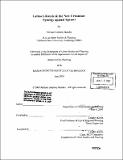Latino lifestyle & the new urbanism : synergy against sprawl
Author(s)
Mendez, Michael Anthony, 1977-
DownloadFull printable version (12.36Mb)
Alternative title
Latino lifestyle and the new urbanism : synergy against sprawl
Other Contributors
Massachusetts Institute of Technology. Dept. of Urban Studies and Planning.
Advisor
Langley Keyes.
Terms of use
Metadata
Show full item recordAbstract
With characteristics differing from majority households, Latino growth is occurring at a time California is conflicted between several urban development models; a choice between developing compact cities, preserving the environment or increasing urban sprawl and slums. A central argument of this thesis is that, given their household characteristics, the growing Latino population (the future majority population group) may become a key player in the construction of more compact cities in California. This thesis demonstrates that the current views towards status quo development and assimilation ignore the opportunity to build upon Latino's propensity for compact cities and negates the possibility to accommodate growth in California in a more sustainable manner. The thesis addresses city developmental policies that pressure Latinos to assimilate to the established U.S. notion of appropriate use of spaces and commuting patterns, and how they mitigate the economic, social and environmental benefits inherent in the Latino lifestyle. Research is presented that shows Latino assimilation of conventional lifestyles or what is referred to as "Latino Sprawl", could result in detrimental consequences not just for Latinos but also the general California population. These implications imply policymakers should shift away from conventional models that perpetuate status quo results and towards policy alternatives that plan for the balance growth of regions and housing models that reflect the diversity and needs that exists within California. Therefore, "Latino New Urbanism", is presented in this thesis as a new development alternative that assesses the changing population dynamics in California and proposes a model that can increase the quality of life of all residents, reduce the amount of environmental impact, provide the home building industry a viable option to profit from the huge projected housing demand and enable local governments to accommodate growth in a more sustainable manner.
Description
Thesis (M.C.P.)--Massachusetts Institute of Technology, Dept. of Urban Studies and Planning, 2003. Includes bibliographical references (p. 107-112).
Date issued
2003Department
Massachusetts Institute of Technology. Department of Urban Studies and PlanningPublisher
Massachusetts Institute of Technology
Keywords
Urban Studies and Planning.